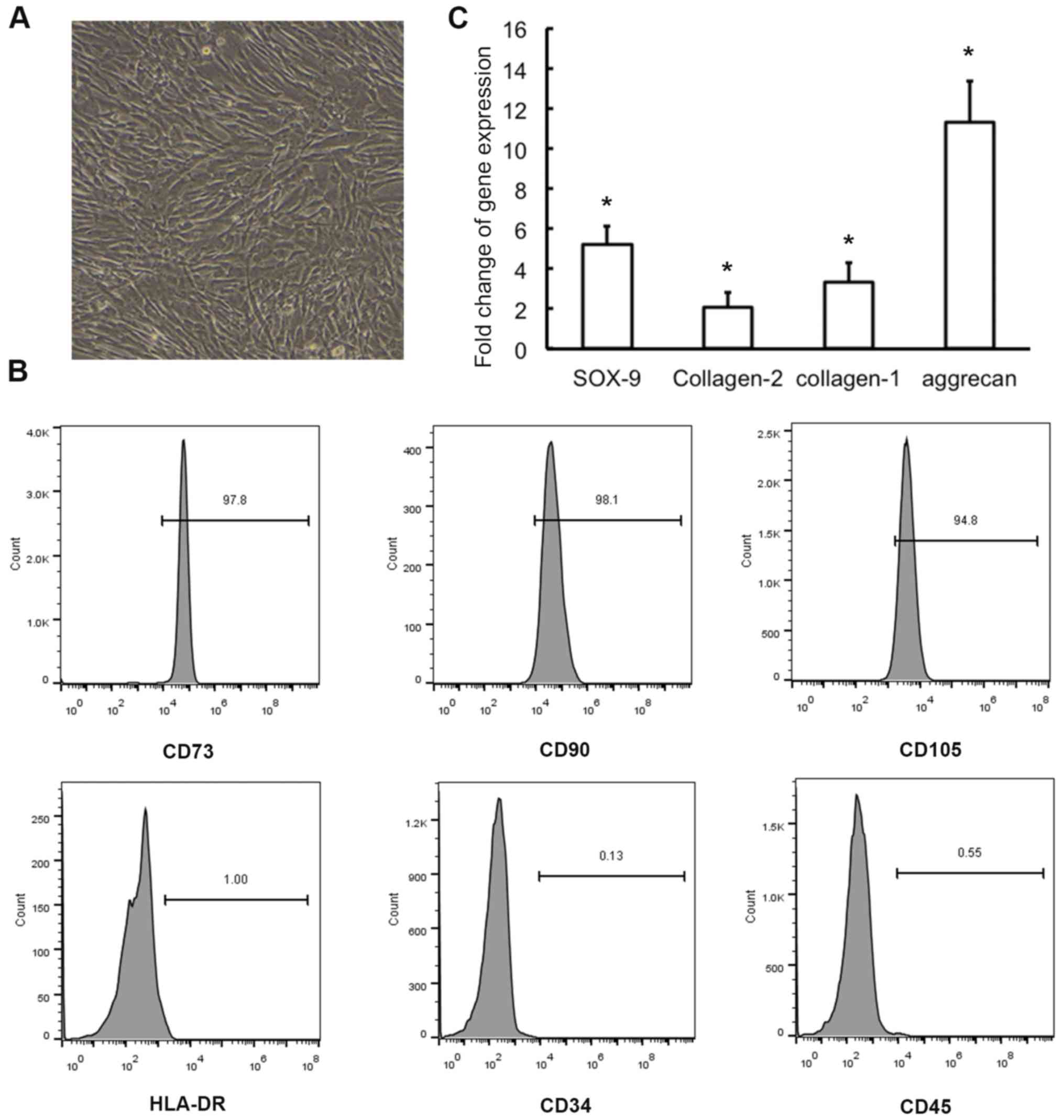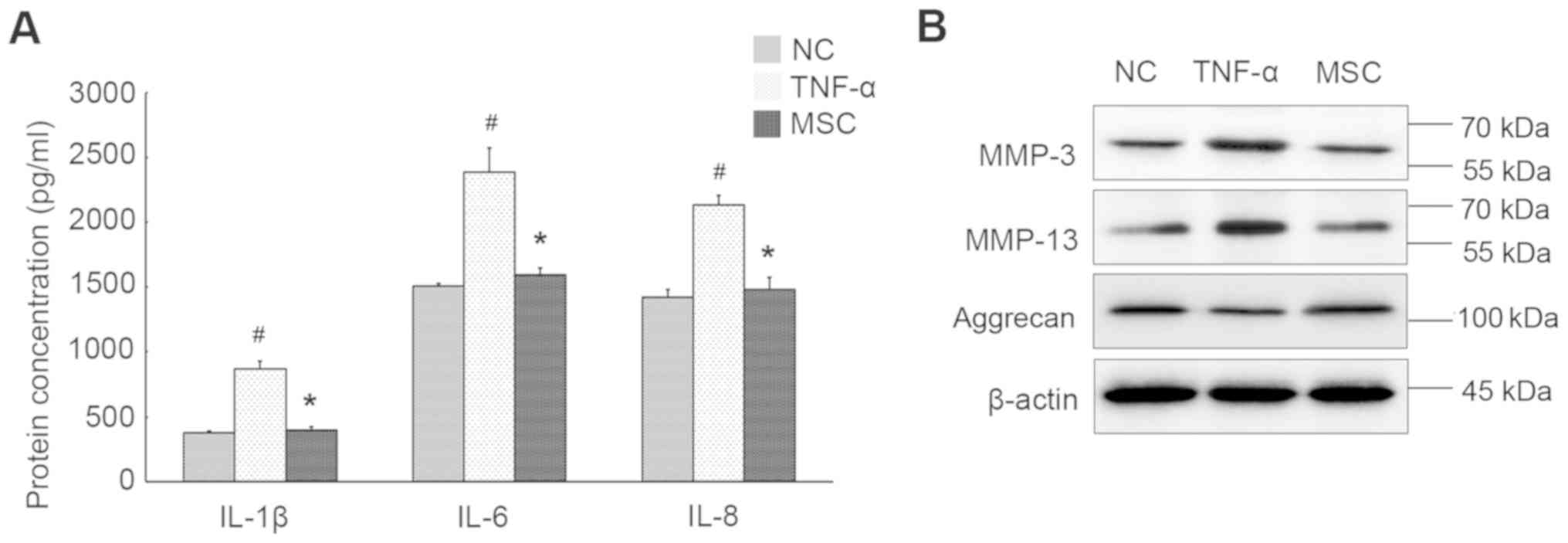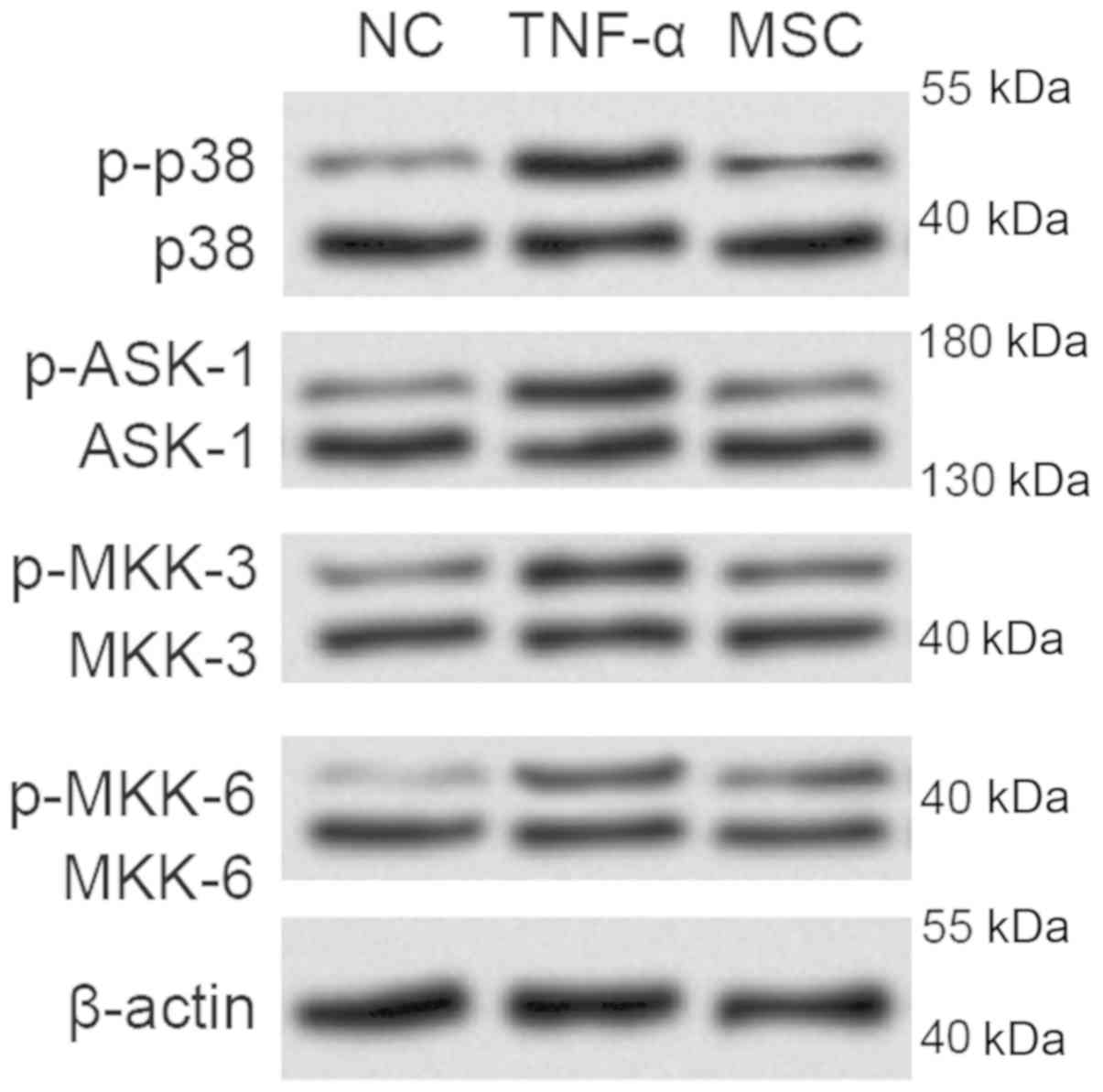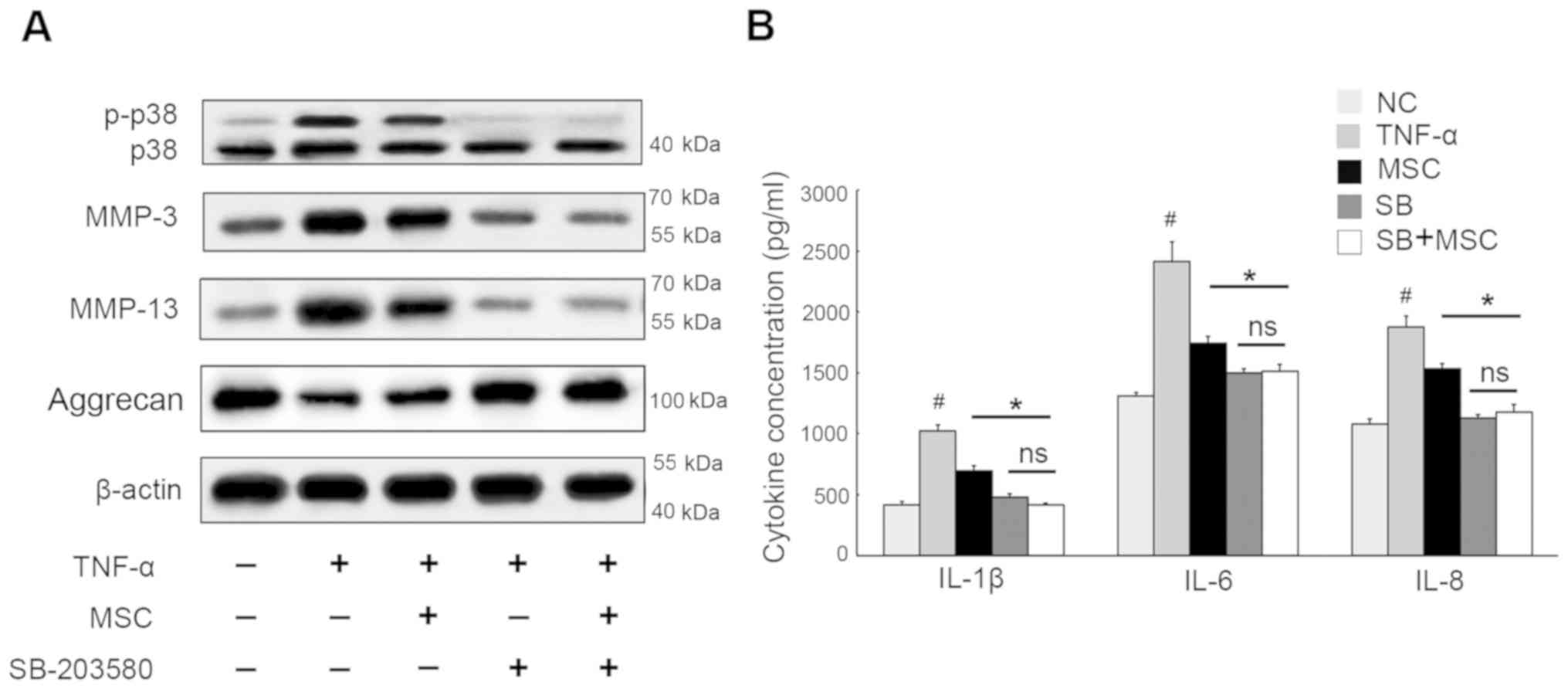|
1
|
McBeth J and Jones K: Epidemiology of
chronic musculoskeletal pain. Best Pract Res Clin Rheumatol.
21:403–425. 2007.PubMed/NCBI View Article : Google Scholar
|
|
2
|
Mathew J, Singh SB, Garis S and Diwan AD:
Backing up the stories: The psychological and social costs of
chronic low-back pain. Int J Spine Surg. 7:e29–e38. 2013.PubMed/NCBI View Article : Google Scholar
|
|
3
|
Zeng Y, Chen C, Liu W, Fu Q, Han Z, Li Y,
Feng S, Li X, Qi C, Wu J, et al: Injectable microcryogels
reinforced alginate encapsulation of mesenchymal stromal cells for
leak-proof delivery and alleviation of canine disc degeneration.
Biomaterials. 59:53–65. 2015.PubMed/NCBI View Article : Google Scholar
|
|
4
|
Phillips KL, Chiverton N, Michael AL, Cole
AA, Breakwell LM, Haddock G, Bunning RA, Cross AK and Le Maitre CL:
The cytokine and chemokine expression profile of nucleus pulposus
cells: Implications for degeneration and regeneration of the
intervertebral disc. Arthritis Res Ther. 15(R213)2013.PubMed/NCBI View
Article : Google Scholar
|
|
5
|
Risbud MV and Shapiro IM: Role of
cytokines in intervertebral disc degeneration: Pain and disc
content. Nat Rev Rheumatol. 10:44–56. 2014.PubMed/NCBI View Article : Google Scholar
|
|
6
|
Loreto C, Musumeci G, Castorina A, Loreto
C and Martinez G: Degenerative disc disease of herniated
intervertebral discs is associated with extracellular matrix
remodeling, vimentin-positive cells and cell death. Ann Anat.
193:156–162. 2011.PubMed/NCBI View Article : Google Scholar
|
|
7
|
Yang SH, Yang KC, Chen CW, Huang TC, Sun
YH and Hu MH: Comparison of transforming hrowth factor-beta1 and
lovastatin on differentiating mesenchymal stem cells toward nucleus
pulposus-like phenotype: An in vitro cell culture study. Asian
Spine J. 13:705–712. 2019.PubMed/NCBI View Article : Google Scholar
|
|
8
|
Vadalà G, Russo F, Ambrosio L, Loppini M
and Denaro V: Stem cells sources for intervertebral disc
regeneration. World J Stem Cells. 8:185–201. 2016.PubMed/NCBI View Article : Google Scholar
|
|
9
|
Wei A, Shen B, Williams L and Diwan A:
Mesenchymal stem cells: Potential application in intervertebral
disc regeneration. Transl Pediatr. 3:71–90. 2014.PubMed/NCBI View Article : Google Scholar
|
|
10
|
Pfirrmann CW, Metzdorf A, Zanetti M,
Hodler J and Boos N: Magnetic resonance classification of lumbar
intervertebral disc degeneration. Spine. 26:1873–1878.
2001.PubMed/NCBI View Article : Google Scholar
|
|
11
|
Yan HS, Hang C, Chen SW, Wang KK and Bo P:
Salvianolic acid B combined with mesenchymal stem cells contributes
to nucleus pulposus regeneration. Connect Tissue Res: Apr 26, 2019
(Epub ahead of print). doi: 10.1080/03008207.2019.1611794.
|
|
12
|
Cao C, Zou J, Liu X, Shapiro A, Moral M,
Luo Z, Shi Q, Liu J, Yang H and Ebraheim N: Bone marrow mesenchymal
stem cells slow intervertebral disc degeneration through the NF-κB
pathway. Spine J. 15:530–538. 2015.PubMed/NCBI View Article : Google Scholar
|
|
13
|
Lan WR, Pan S, Li HY, Sun C, Chang X, Lu
K, Jiang CQ, Zuo R, Zhou Y and Li CQ: Inhibition of the Notch1
pathway promotes the effects of nucleus pulposus cell-derived
exosomes on the differentiation of mesenchymal stem cells into
nucleus pulposus-like cells in rats. Stem Cells Int.
2019(8404168)2019.PubMed/NCBI View Article : Google Scholar
|
|
14
|
Arutyunyan I, Elchaninov A, Makarov A and
Fatkhudinov T: Umbilical cord as prospective source for mesenchymal
stem cell-based therapy. Stem Cells Int.
2016(6901286)2016.PubMed/NCBI View Article : Google Scholar
|
|
15
|
Fierabracci A, Del Fattore A, Luciano R
and Muraca M, Teti A and Muraca M: Recent advances in mesenchymal
stem cell immunomodulation: The role of microvesicles. Cell
Transplant. 24:133–149. 2015.PubMed/NCBI View Article : Google Scholar
|
|
16
|
Szychlinska MA, Stoddart MJ, D'Amora U,
Ambrosio L, Alini M and Musumeci G: Mesenchymal stem cell-based
cartilage regeneration approach and cell senescence: Can we
manipulate cell aging and function? Tissue Eng Part B Rev.
23:529–539. 2017.PubMed/NCBI View Article : Google Scholar
|
|
17
|
Gardner OFW, Musumeci G, Neumann AJ, Eglin
D, Archer CW, Alini M and Stoddart MJ: Asymmetrical seeding of MSCs
into fibrin-poly(ester-urethane) scaffolds and its effect on
mechanically induced chondrogenesis. J Tissue Eng Regen Med.
11:2912–2921. 2017.PubMed/NCBI View Article : Google Scholar
|
|
18
|
Szychlinska MA, Castrogiovanni P, Nsir H,
Di Rosa M, Guglielmino C, Parenti R, Calabrese G, Pricoco E,
Salvatorelli L, Magro G, et al: Engineered cartilage regeneration
from adipose tissue derived-mesenchymal stem cells: A
morphomolecular study on osteoblast, chondrocyte and apoptosis
evaluation. Exp Cell Res. 357:222–235. 2017.PubMed/NCBI View Article : Google Scholar
|
|
19
|
Musumeci G, Mobasheri A, Trovato FM,
Szychlinska MA, Graziano ACE, Lo Furno D, Avola R, Mangano S,
Giuffrida R and Cardile V: Biosynthesis of collagen I, II, RUNX2
and lubricin at different time points of chondrogenic
differentiation in a 3D in vitro model of human mesenchymal stem
cells derived from adipose tissue. Acta Histochem. 116:1407–1417.
2014.PubMed/NCBI View Article : Google Scholar
|
|
20
|
Studer RK, Aboka AM, Gilbertson LG,
Georgescu H, Sowa G, Vo N and Kang JD: p38 MAPK inhibition in
nucleus pulposus cells: A potential target for treating
intervertebral disc degeneration. Spine. 32:2827–2833.
2007.PubMed/NCBI View Article : Google Scholar
|
|
21
|
Krupkova O, Sadowska A, Kameda T, Hitzl W,
Hausmann ON, Klasen J and Wuertz-Kozak K: p38 MAPK facilitates
crosstalk between endoplasmic reticulum stress and IL-6 release in
the intervertebral disc. Front Immunol. 9(1706)2018.PubMed/NCBI View Article : Google Scholar
|
|
22
|
Liu C, Yang H, Gao F, Li X, An Y, Wang J
and Jin A: Resistin promotes intervertebral disc degeneration by
upregulation of ADAMTS-5 through p38 MAPK signaling pathway. Spine.
41:1414–1420. 2016.PubMed/NCBI View Article : Google Scholar
|
|
23
|
Pang L, Li P, Zhang R, Xu Y, Song L and
Zhou Q: Role of p38-MAPK pathway in the effects of high-magnitude
compression on nucleus pulposus cell senescence in a disc perfusion
culture. Biosci Rep. 37(BSR20170718)2017.PubMed/NCBI View Article : Google Scholar
|


















